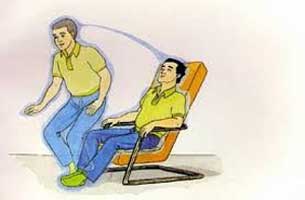- Home
- Editorial
- News
- Practice Guidelines
- Anesthesiology Guidelines
- Cancer Guidelines
- Cardiac Sciences Guidelines
- Critical Care Guidelines
- Dentistry Guidelines
- Dermatology Guidelines
- Diabetes and Endo Guidelines
- Diagnostics Guidelines
- ENT Guidelines
- Featured Practice Guidelines
- Gastroenterology Guidelines
- Geriatrics Guidelines
- Medicine Guidelines
- Nephrology Guidelines
- Neurosciences Guidelines
- Obs and Gynae Guidelines
- Ophthalmology Guidelines
- Orthopaedics Guidelines
- Paediatrics Guidelines
- Psychiatry Guidelines
- Pulmonology Guidelines
- Radiology Guidelines
- Surgery Guidelines
- Urology Guidelines
Higher salt intake harmful in low BP light headedness, finds study

Findings of a new Study have challenged experts’ traditional recommendation of higher salt intake for postural Hypotension or lightheadedness. Researchers at Beth Israel Deaconess Medical Center (BIDMC) have found that higher sodium intake, when studied in the context of the DASH-Sodium trial (Dietary Approaches to Stop Hypertension), actually increases lightheadedness and may be harmful. The study appeared in the Journal of Clinical Hypertension.
Postural lightheadedness with standing results from a gravitational drop in blood pressure and is common among adults. In many cases, it is of no consequence but it is an important contributing factor to harmful clinical events, such as falls. Therefore greater sodium intake is widely viewed as an intervention for preventing lightheadedness when moving from seated to standing positions.
The researchers used data from the completed DASH-Sodium trial, that looked at the effects of three different sodium levels (1500, 2300, and 3300 mg/d) on blood pressure. All participants ate each of the three sodium levels in random order for four weeks. Half of the participants ate the sodium levels in the context of a typical American diet (a control diet) while the other half ate the sodium levels consistent with DASH diet guidelines. The original trial showed that by lowering sodium, blood pressure was also lowered – and was the basis for current guidelines for sodium consumption.
The study also asked people to rate their experience of lightheadedness when they stood up, although these data were never reported. As such, in this secondary analysis of the DASH-Sodium trial, the researchers examined the impact of increased sodium intake on postural lightheadedness.
“Our study has real clinical and research implications,” said Stephen Juraschek, MD, PhD, the study’s corresponding author and a primary care physician at BIDMC. “Our results serve to caution health practitioners against recommending increased sodium intake as a universal treatment for lightheadedness. Additionally, our results demonstrate the need for additional research to understand the role of sodium, and more broadly of diet, on lightheadedness."
The study’s findings suggest that concerns about reducing sodium causing lightheadedness may not be scientifically based. It also further questions recommendations to use sodium to treat lightheadedness, an intervention that could have negative effects on cardiovascular health.
“Health practitioners initiating sodium interventions for orthostatic symptoms now have some evidence that sodium might actually worsen symptoms,” said Juraschek. “Clinicians should check on symptoms after initiation and even question the utility of this approach. More importantly, research is needed to understand the effects of sodium on physical function, particularly in older adults.”
The study also examined subgroups of the population, including older adults (age 60 and above) and adults with obesity. The effects of sodium on lightheadedness differed between these groups. In particular, higher sodium increased lightheadedness in younger people, but modestly reduced lightheadedness in older adults. “Sodium is widespread in our foods, yet its effects are poorly understood,” said Juraschek. “This study illustrates the importance of more trials involving the foods we eat so that we can better understand what constitutes a healthy diet.”

Disclaimer: This site is primarily intended for healthcare professionals. Any content/information on this website does not replace the advice of medical and/or health professionals and should not be construed as medical/diagnostic advice/endorsement or prescription. Use of this site is subject to our terms of use, privacy policy, advertisement policy. © 2020 Minerva Medical Treatment Pvt Ltd